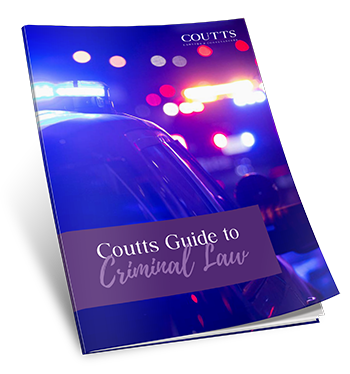We’ve Got You Covered
Coutts provides expert legal representation for individuals accused of Sexual Assault. Our team has deep experience in handling sensitive and complex sexual assault cases, ensuring a respectful and thorough approach. We understand the seriousness and intricacies of these allegations and are dedicated to upholding our clients’ rights while seeking the best possible outcome. Our strategy is comprehensive, focusing on meticulous evidence examination, empathetic legal advocacy, and strategic defence planning.

Luisa Gaetani
Partner
Book Your Sexual Assault Consultation Now
What is Sexual Assault?
The offence of sexual assault is contained in Section 61I of the Crimes Act 1900, which provides that “Any person who has sexual intercourse with another person without the consent of the other person and who knows that the other person does not consent to the sexual intercourse is liable to imprisonment for 14 years”. The Act also defines the acts which constitute sexual intercourse, and Section 61HA provides that sexual intercourse means:
- Sexual connection occasioned by the penetration to any extent of the genitalia (including a surgically constructed vagina) of a female person or the anus of any person by —
- Any part of the body of another person, or
- Any object manipulated by another person,
- Except where the penetration is carried out for proper medical purposes, or
- Sexual connection occasioned by the introduction of any part of the penis of a person into the mouth of another person, or
- Cunnilingus, or
- The continuation of sexual intercourse as defined in paragraphs (a), (b) or (c).
What is consent?
In NSW, consent is a fundamental part of sexual offence laws. A sexual offence only occurs when someone has not consented to the sexual act.
For the purposes of the Act, consent is defined by the act as occurring “if the person freely and voluntarily agrees to the sexual activity at the time of the act” (Crimes Legislation Amendment (Sexual Consent Reforms) Act 2021). Therefore, consent is not presumed but rather requires affirmative confirmation at the time of the sexual activity. The acquisition of sexual consent involves ongoing and mutual communication.
A person is considered to have not consented to a sexual act unless they say or do something that is indicative of consent.
In addition, the Act states that a person knows that the victim did not consent to the sexual activity if:
- The person knows that the alleged victim does not consent to the sexual activity, or
- The person is reckless as to whether the alleged victim consents to the sexual activity, or
- The person has no reasonable grounds for believing that the alleged victim consents to the sexual activity. (Section 61HE (3) of the Crimes Act 1900).
To determine whether the accused knew that the victim did not consent to the sexual activity, the Court must take into account all the circumstances of the case including any steps taken by the accused to ascertain whether the victim consents to the activity but cannot take into account any self-induced intoxication of the accused (Section 61HE (4) of the Crimes Act 1900).
The legislation also defines the circumstances where any consent is negated, including where the victim does not have the capacity to give consent; where the victim is unconscious or asleep; if the victim consents due to threats of force or terror; because the victim is unlawfully detained; due to a mistaken belief as to identity of the accused; mistaken belief that the victim is married to the accused; mistaken belief that the sexual activity is for health or hygienic purposes; or any other mistaken belief about the nature of the activity induced by fraudulent means.
What do you need to secure a conviction?
In order to secure a conviction, the Prosecution must prove beyond reasonable doubt the following elements:
- That the accused had sexual intercourse with the victim;
- That the victim did not consent; and
- That the accused knew that the victim did not consent.
What to do if you are accused of sexual assault?
There are a number of defences available to a charge of sexual assault, which include the following:
• Maintaining that no sexual intercourse occurred;
• Claiming that the victim consented to the sexual intercourse;
• Claiming that the accused held a reasonable belief that the victim consented to the sexual intercourse
What to Expect with Coutts Lawyers
Step 1: Initial Contact
Reach out to Coutts Lawyers via our website, phone, or in person. Briefly describe your matter.
Step 2: Consultation Appointment
Schedule and attend a meeting with a Coutts lawyer to discuss the specifics of your matter and desired outcomes.
Step 3: Information & Legal Advice
Share all related documents and information. Your lawyer will review everything, clarify aspects as needed, and then advise on the best action course.
Step 4: Action Plan Development
Based on the advice, an appropriate action plan will be formulated. This may involve communication, documentation processes, or further legal steps.
Step 5: Implementation
Execute the action plan, addressing a range of legal scenarios as necessary.
Step 6: Resolution & Closure
Navigate towards a resolution, with the path determined by the nature of the matter. Your Lawyer will outline any final actions or considerations.
Book Your Sexual Assault Consultation Now
Introducing Luisa
Your Compassionate Lawyer
Meet Luisa, a Partner at Coutts Lawyers & Conveyancers, and an Accredited Family Law specialist. Luisa is the head of our esteemed Family Law & Criminal Team. Boasting over a decade of expertise, Luisa blends sensitivity with practicality, forging deep connections and trust with her clients. Her reputation as a foremost authority in Criminal and Family law is well-deserved.


Connect with Luisa Today
Multi Award-Winning
Law Firm

Sexual Assault FAQ’s
Consent, vital to sexual offence laws in NSW, is when someone freely and voluntarily agrees to the sexual act at the time of the act, requiring clear, affirmative, and ongoing communication as per the Crimes Legislation Amendment (Sexual Consent Reforms) Act 2021. It is imperative to confirm consent before any sexual act, and as consent can be withdrawn, it is also imperative to confirm consent during any sexual act.
Yes, a person can be found guilty if there are no reasonable grounds for their belief in consent, if they were reckless regarding consent, or if they were aware of the lack of consent, taking into consideration all circumstances, excluding self-induced intoxication. However, an accused person cannot have a reasonable belief that another person consented to a sexual activity unless the accused person said or did anything to find out whether the other person consented.
Consent is nullified in circumstances where victims lack the capacity to consent, are unconscious, are under threats, are unlawfully detained, have a mistaken belief regarding the accused’s identity, or are under any other mistaken belief about the act due to fraudulent means.
To secure a conviction, the prosecution must substantiate, beyond a reasonable doubt, that sexual intercourse occurred without the victim’s consent and that the accused was cognisant of the lack of consent.
If falsely accused, it is crucial to immediately seek legal representation and explore available defences such as asserting that no sexual intercourse occurred, claiming that the victim consented, or demonstrating a reasonable belief in the victim’s consent. Comprehensive consultation with the experienced Criminal Law team at Coutts is paramount before interacting with law enforcement or the court.
Download your FREE Criminal Law Guide!



